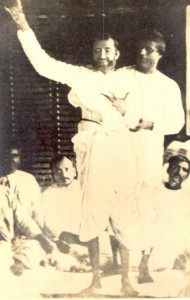
Sri Ramakrishna in Samadhi
Sri Ramakrishna would often explain to his devotees the obstacles in the path of devotion. He would say that there are both gross and subtle obstacles blocking the way of true enlightenment.
Normally, sadhakas (practitioners) are aware of the six passions such as lust, anger, greed, jealousy, delusion and avarice*. But there are also eight fetters which bind the sadhaka. These are fear, shame, hatred, pride of caste, secretiveness, pride of lineage, pride of good conduct and grief**.
Quite often these fetters prove to be even more difficult to get rid of. In his case, as he was an extraordinary manifestation of the power of God, these fetters did not really affect Sri Ramakrishna. Yet, to set an example for others, he performed a supreme act of service to demonstrate how to get rid of the pride of caste or lineage. He was born in an orthodox Brahmin family. But at the dead of night he entered the house of a sweeper who used to live in the Dakshineswar temple precincts. This gentleman, although he was performing menial services, was a great devotee of God.
Sri Ramakrishna quietly went and cleaned the washroom in his house so that the idea of caste did not bind him. He was at that time the priest at the Kali temple of Dakshineswar and was an extremely respected person. Hence, during day time it was impossible for him to even enter the house of Rasik, the sweeper. But his urge to get rid of the pride of caste was so dominant in his mind that he undertook the desperate step to enter the house of Rasik at the dead of night. Then he cleaned the places which no Brahmin would even enter.
Thus Sri Ramakrishna, through an example from his own life, demonstrated to the devotees how to get rid of one of the most difficult hurdles in the path of a sadhaka.
* काम, क्रोध, लोभ, मोह, मद, मात्सर्य
** Tantra refers to “अष्ठ पाश” or eight fetters – घॄण (aversion), लज्जा (shame), भय (fear), शङ्का (doubt), जुगुप्सा (disgust), कुल (attachment to a group based on activity), जाति (attachment to a group based on birth) and शील (good character and modesty).
– by Swami Shantatmananda, Sunday Guardian, 2nd Aug 2014
